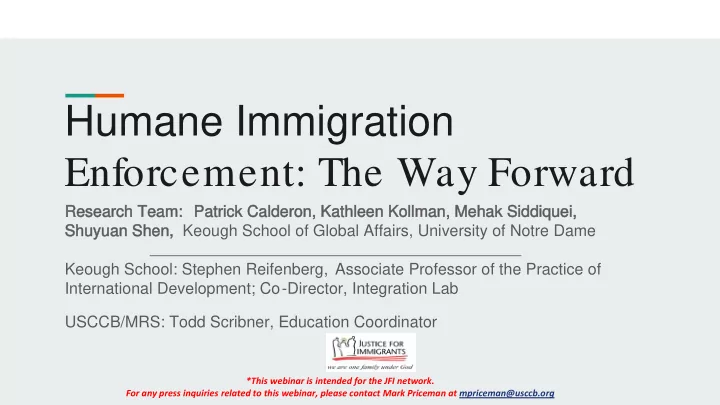

Humane Immigration Enforcement: The Way Forward Research Team: Research Team: Patrick Calderon, Kathleen Kollman, Mehak Siddiquei, Patrick Calderon, Kathleen Kollman, Mehak Siddiquei, Shuyuan Shen, Shuyuan Shen, Keough School of Global Affairs, University of Notre Dame Keough School: Stephen Reifenberg, Associate Professor of the Practice of International Development; Co-Director, Integration Lab USCCB/MRS: Todd Scribner, Education Coordinator *This webinar is intended for the JFI network. For any press inquiries related to this webinar, please contact Mark Priceman at mpriceman@usccb.org
What does it mean for immigration enforcement to be humane? How do state policies measure up to standards of humane enforcement?
Greece USA Germany
Principle 1. Liberty: Principle 1. Liberty: Enforcement systems should have a presumption against the deprivation of migrants’ liberty, giving preference to dignified alternatives to formal detention and ensuring that families are neither detained nor separated. Principle 2. Living & Reception Conditions: Principle 2. Living & Reception Conditions: Accommodations for migrants, whether in reception facilities or, where applicable, in detention centers, should be dignified and should provide for basic needs and access to appropriate resources.
Principle 3. Information & Accompaniment: Principle 3. Information & Accompaniment: Migrants should be provided legal and other forms of guidance, information, and assistance throughout the enforcement process, so as to maintain their agency and dignity as individuals as well as ensure higher levels of compliance with immigration proceedings. Principle 4. Efficiency & Individual Assessment: Principle 4. Efficiency & Individual Assessment: Determinations of asylum and immigration status should be conducted in a timely, individualized manner that respects due process.
Principle 5. During & Beyond Return: Principle 5. During & Beyond Return: Forced removals should be used as a last resort and should not separate families or endanger migrants’ safety.
Questions or comments? A new team of Keough graduate students will travel to Central America in 2020 to conduct research on post-deportation reintegration programs. What, in your view, should be the guiding parameters of their research?
Recommend
More recommend